CONVERSATION WITH GIAMPAOLO GROSSI, KIND LEADER
(French version here,Italian version here)
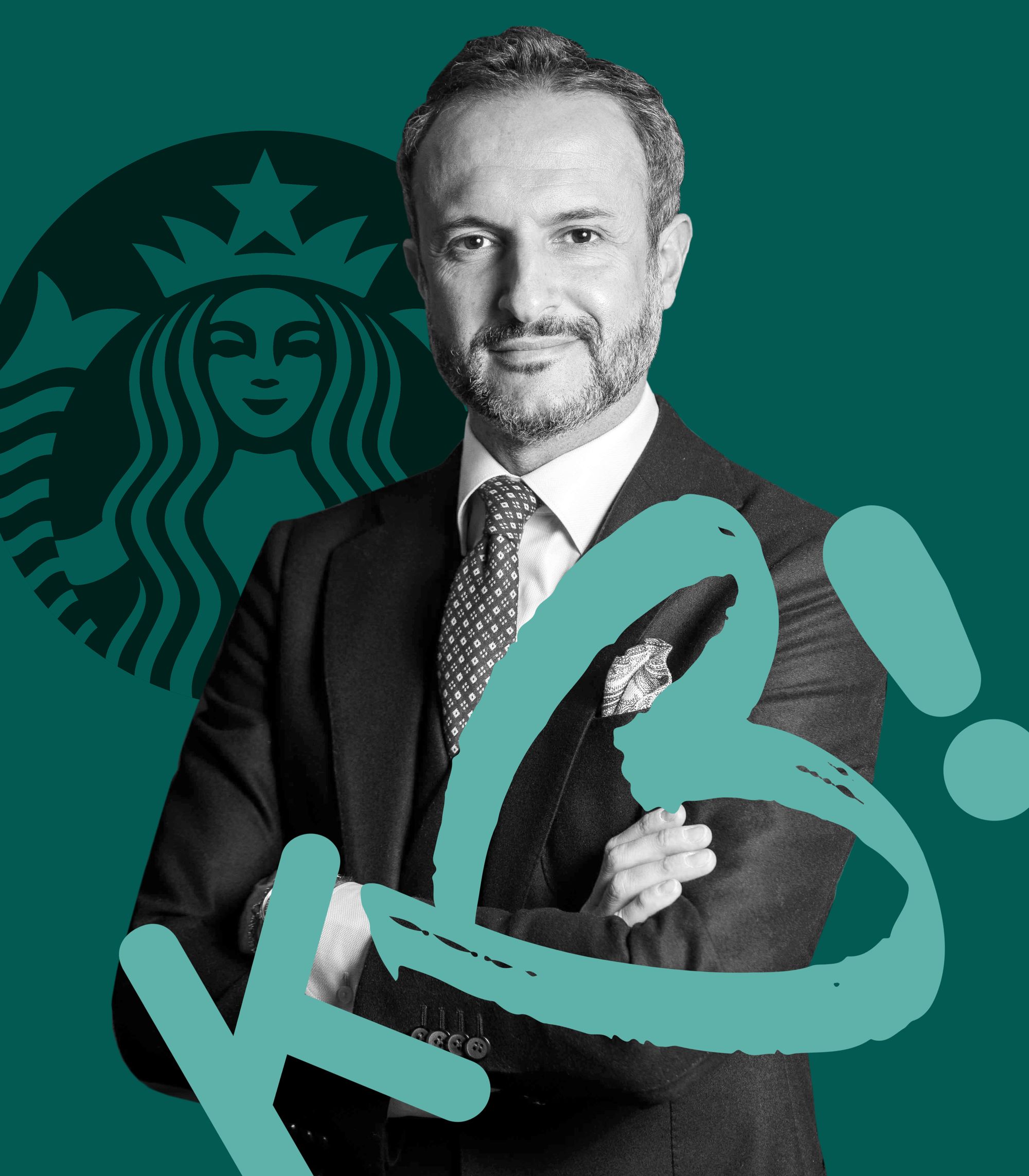
Born in Florence, Giampaolo Grossi is the current General Manager of Starbucks Italy. For those familiar with Milan, he oversaw the opening of the Starbucks Roastery, which has now become one of the symbols of the city. Before taking over the leadership of Starbucks Italy, Giampaolo traveled the world and did many different jobs, dealing with luxury and hospitality. Rare fact among business leaders, Giampaolo loves to write and communicate. He founded the Lusso Gentile initiative, and on behalf of KINDNESSforBusiness, Germana Barba interviewed him to learn about his personal conception of kindness.
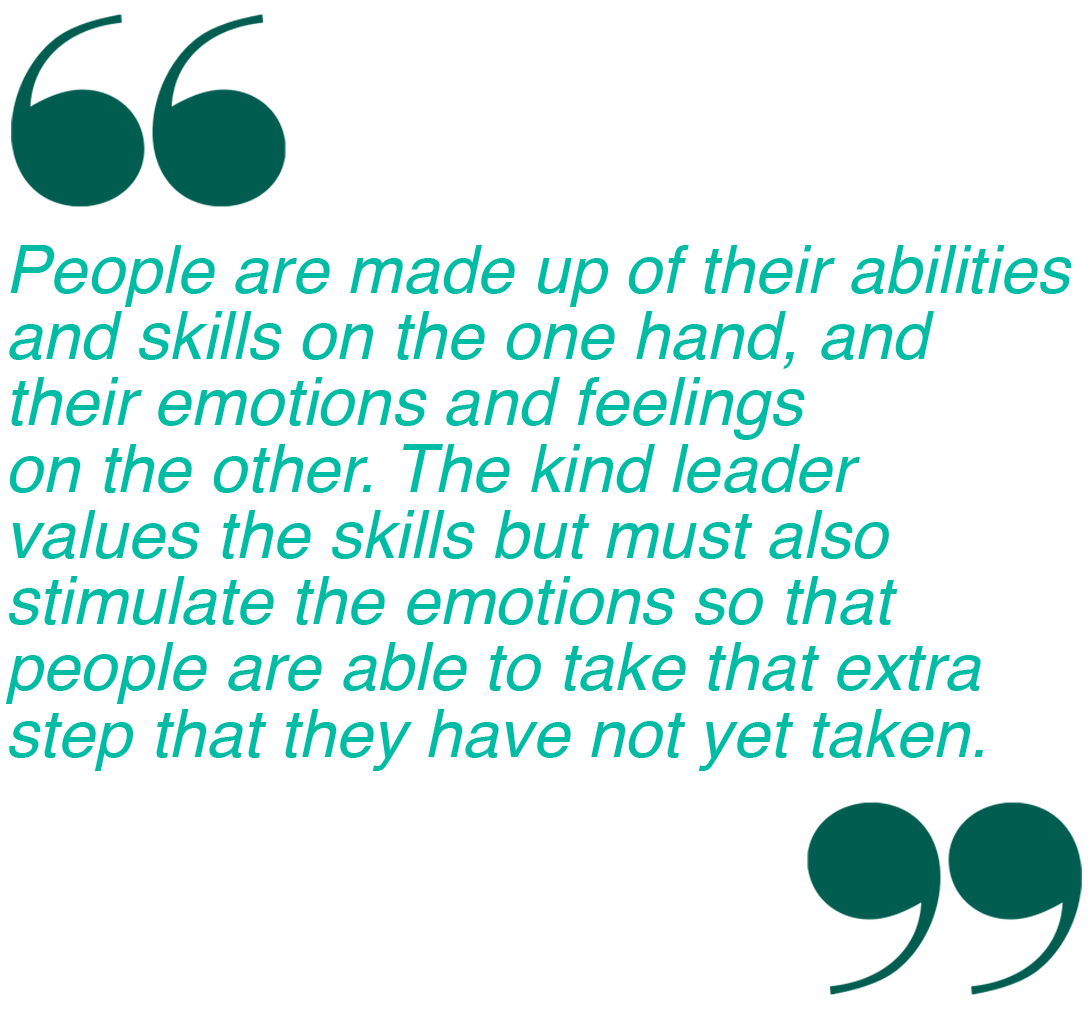
Thank you for agreeing to speak to KINDNESSforBusiness. I would like to start by asking you how it feels to lead a foreign business like Starbucks that represents a lifestyle, in a country like Italy that understands lifestyle ...
It is an honor. It is a great fortune to represent a company like Starbucks in such a delicate market but which is also an observation point for many professionals. It is also a great responsibility. Starbucks represents a lifestyle, a status symbol, that was built day after day in the company's 50-year history. Our mission is "To inspire and nurture the human spirit - one person, one cup, one neighborhood at a time." Starbucks is not a coffee company. It is a company of people who serve coffee. People and the relationship with others are at the center of our work.
On the street they stop you and call you "Mr Starbucks" ...
When this happens I usually reply that "Mr Starbucks" is someone much higher than me ... But of course it's nice. When Starbucks founder Howard Schultz created this company in the 1970s, he was heavily influenced by his own personal experience. One of the things he did in the 1980s was to offer health coverage to all the company's workers, well before Obamacare. He did it because when he was little his father, who was a transporter and who was the only one to bring the money home, broke his leg and had to stop working, and in the United States at that time not working meant not being paid. The human and personal dimension always ends up being reflected in organizations.
What is kindness to you?
Kindness is music. It should be the air you breathe. That harmonious morning with the sun outside that makes your soul happy. Kindness is a gift that is given to others and above all that is made to oneself. In fact, giving kindness to others means first and foremost loving yourself. I feel a lot of satisfaction when I see in the eyes of other people the emotion of having appreciated a kind gesture. It is also a skill that needs to be trained continuously. Because we all like to receive kindness but not all of us give it. In Italy there is a tendency to associate kindness with a social positioning. But in reality, kindness is accessible to everyone.
How does kindness move into business? What is gentle leadership for you?
Kind leadership cares about people. It dedicates quality time to people. It doesn't necessarily mean listening to others for hours on end. But it means doing it in a conscious and careful way, so as to give people the space to express their opinion, to give feedback. It also means sharing one's vulnerability to empathize with others. People are made up of their abilities and skills on the one hand, and their emotions and feelings on the other. The kind leader must value the skills but must also stimulate the emotions so that people are able to take that extra step that they have not yet taken.
How was this philosophy born in you?
At 6, I lost my mother. My grandmother dropped everything and moved to our house to raise my sister and me. She gave me extraordinary strength because she had the courage to leave everything to devote herself to us. And she passed on her kindness to me because it was her way of being. She taught me that when someone comes to have coffee, you set the table, bring out the good service and the biscuits, and all the attentions. When they ask me who my mentor was, my answer is: my grandmother.
Behind every leader there is always a personal story ...
I don't call myself a leader, it's not up to me to do it. What I do know is that being a leader is something that has to be earned. You have to train continuously to be able to inspire and guide others. A leader must retain the ability to be as excited as he was when he was a child. When we grow up we forget where we came from and the path we have taken. I get excited to see a dog wagging its tail, the child in the car in front of me greeting me. Develop sensitivity to details and connect details to stories and to learnings. To better understand others.
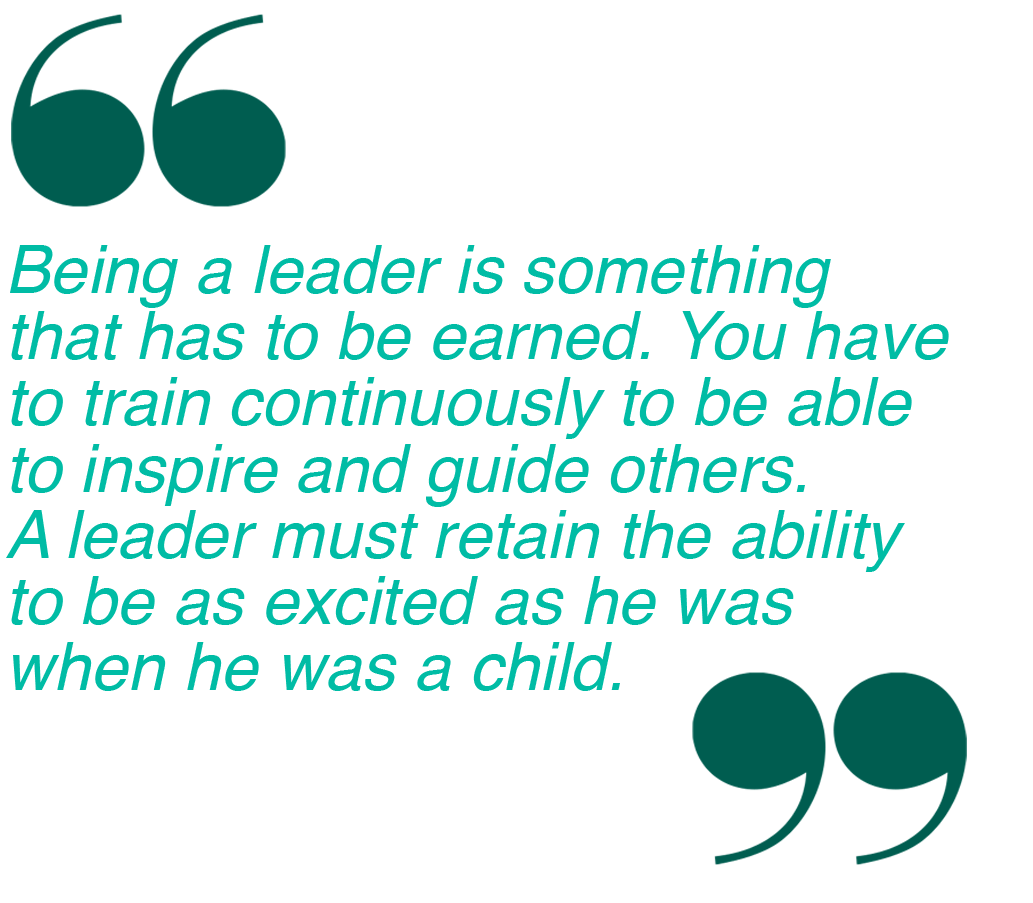
How does kindness translate into the company you lead? How is kindness "institutionalized"?
Of course Starbucks has processes and systems that practice kindness. When we evaluate people we always start with positive results and only afterwards do we move on to discuss areas for improvement. But it is above all a culture. The culture of recognition of the work done by people. We start every meeting with a coffee, we tell each other how it goes and we share our personal lives. In our meetings we always have 2 empty chairs, one that symbolizes our people (whom we call partners, not employees), the other our customers. And every time we ask ourselves what impact our decision will have on our people and our customers.
What advice would you give to business leaders who want to take a path to introduce kindness into their organization?
A leader must start with awareness. You need to know where you are on the way. Even if it means admitting that you are not where you should be. Secondly, you have to share the vision. If you don't share the vision of where you want to go, others will have a hard time following you. This is a mistake that I also make. Sometimes I underestimate the fact that others don't think like me and don't feel like me. The other consideration is that we must realize that the generations born in the last 30 years have evolved much more rapidly than the previous ones. They are born with technology as an integral part of their being for example. You have to adapt your style taking into account their characteristics.
Sport plays an important role in your life. If you think about sport and kindness, what comes to your mind?
The memory of when I started playing football at the age of six. Especially the moment when you waited on the sidelines - with patience and respect - for another child to invite you to play. And the emotion of overcoming fears through the expression of physicality.
OUR GUEST
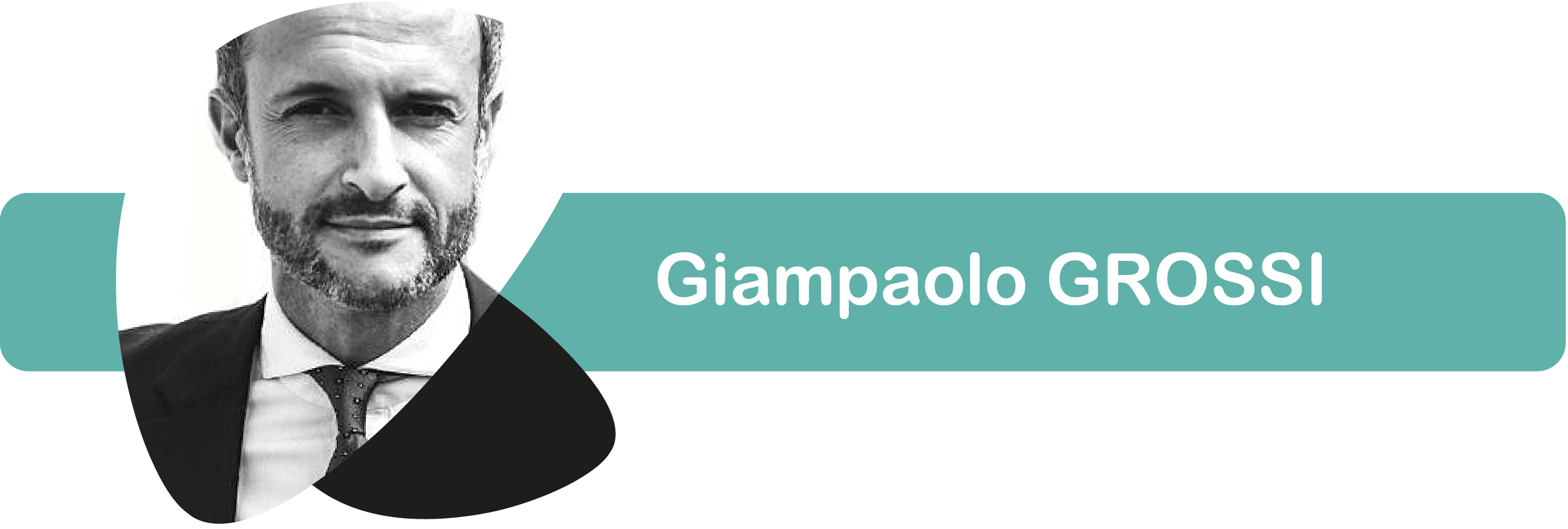
Giampaolo, 40, was born in Florence and makes his sporting career a spirit of life that he applies to the world of work. He travels the world with various international experiences in hospitality until returning to Italy, where he lands in Starbucks in Milan. A positive person, determined in his goals, he undertakes the arrival in Italy of the American giant with his coffee, defying all expectations.
“Starbucks is giving me the opportunity to grow professionally but even more importantly on a human level, something in which I invest a lot of my time” - Giampaolo Grossi.
French version
CONVERSATION AVEC GIAMPAOLO GROSSI, LEADER KIND

Né à Florence, Giampaolo Grossi est l'actuel directeur général de Starbucks Italie. Pour ceux qui connaissent Milan, il a supervisé l'ouverture du Starbucks Roastery, devenu aujourd'hui l'un des symboles de la ville. Avant de prendre la direction de Starbucks Italie, Giampaolo a parcouru le monde et a exercé de nombreux métiers différents, dans le domaine du luxe et de l'hôtellerie. Fait rare parmi les chefs d'entreprise, Giampaolo aime écrire et communiquer. Il a fondé l'initiative Lusso Gentile, et au nom de KINDNESSforBusiness, Germana Barba l'a interviewé pour en savoir plus sur sa conception personnelle de la Kindness.
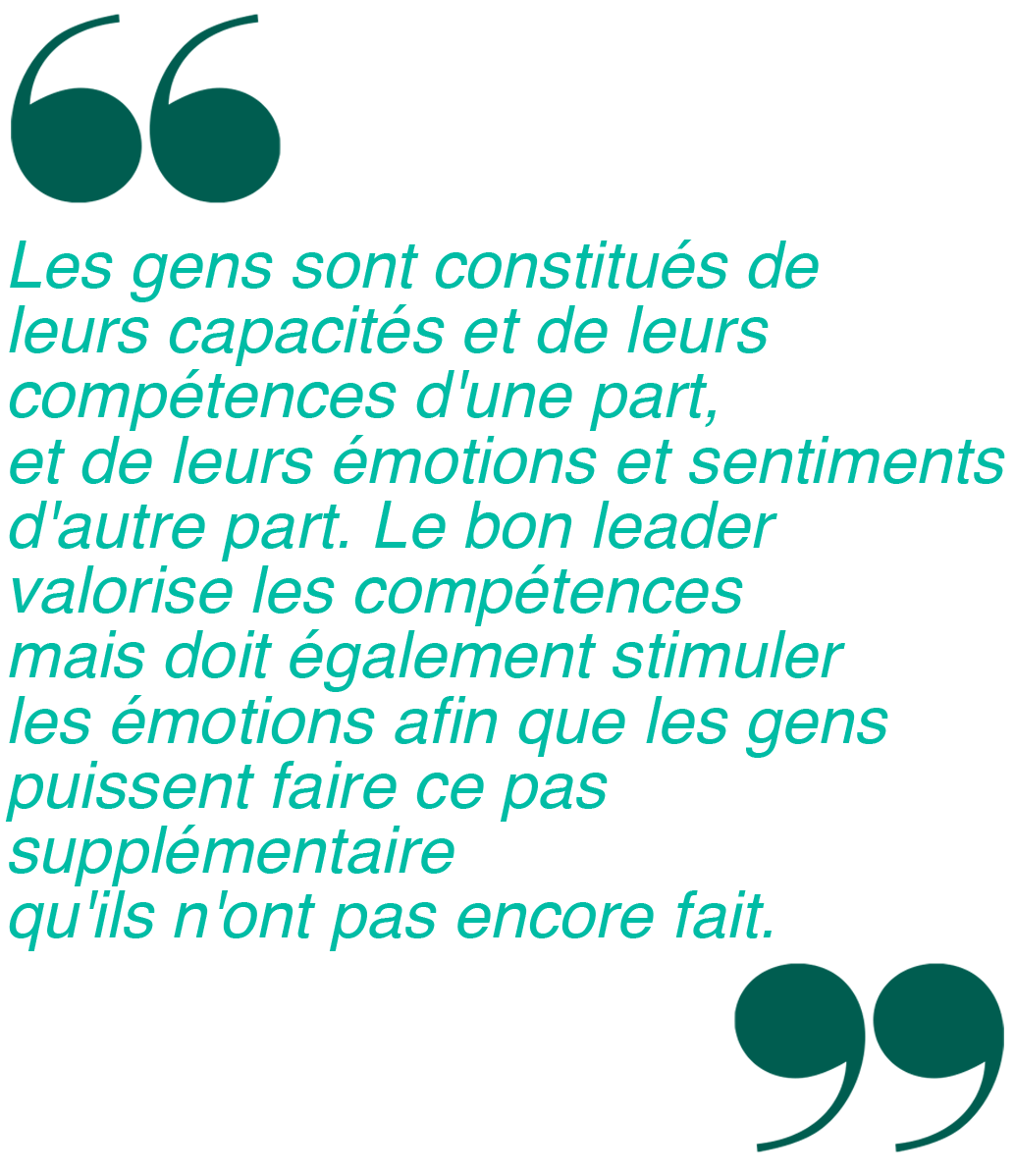
Merci d'avoir accepté de parler à KINDNESSforBusiness. Je voudrais commencer par vous demander ce que cela fait de diriger une entreprise étrangère comme Starbucks qui représente un style de vie, dans un pays comme l'Italie qui comprend le style de vie ...
C'est un honneur. C'est une grande chance de représenter une entreprise comme Starbucks sur un marché aussi spécifique mais qui est aussi un point d'observation pour de nombreux professionnels. C'est aussi une grande responsabilité. Starbucks représente un style de vie, un symbole de statut social, qui s'est construit jour après jour au cours des 50 ans d'histoire de l'entreprise. Notre mission est "d'inspirer et de nourrir l'esprit humain - une personne, une tasse, un quartier à la fois." Starbucks n'est pas une entreprise de café. C'est une entreprise de personnes qui servent du café. L'humain et la relation aux autres sont au centre de notre travail.
Dans la rue, on vous arrête et on vous appelle "Mr Starbucks"...
Lorsque cela se produit, je réponds généralement que "Mr Starbucks" est quelqu'un de bien plus grand... Mais bien sûr, c'est sympa. Lorsque le fondateur de Starbucks, Howard Schultz, a créé cette entreprise dans les années 1970, il a été fortement influencé par sa propre expérience personnelle. L'une des choses qu'il a faites dans les années 1980 a été d'offrir une couverture santé à tous les travailleurs de l'entreprise, bien avant l'Obamacare. Il l'a fait parce que, quand il était petit, son père, qui était transporteur et qui était le seul à ramener l'argent à la maison, s'est cassé la jambe et a dû arrêter de travailler. Et aux États-Unis à cette époque ne pas travailler signifiait ne pas être payé . La dimension humaine et personnelle finit toujours par se refléter dans les organisations.
Qu'est-ce que la kindness pour vous?
La kindness, c'est de la musique. C'est l'air que vous respirez. C'est ce matin harmonieux et ensoleillé qui rend votre âme heureuse. La kindness est un cadeau que l'on fait aux autres et surtout que l'on se fait à soi-même. En fait, donner de la kindness aux autres, c'est avant tout s'aimer soi-même. Je ressens beaucoup de satisfaction quand je vois dans les yeux des autres l'émotion d'avoir apprécié un geste bienveillant. C'est aussi une compétence qui doit être pratiquée en permanence. Parce que nous aimons tous recevoir de la kindness , mais nous ne la donnons pas tous. En Italie, il existe une tendance à associer la kindness à un positionnement social. Mais en réalité, la kindness est accessible à tous.
Comment la kindness trouve-elle son chemin dans le monde de l'entreprise ? Qu'est-ce qu'un leadership kind pour vous?
Un bon leadership prend soin des gens. Il leur consacre du temps de qualité. Cela ne signifie pas nécessairement écouter les autres pendant des heures. Mais cela signifie le faire de manière consciente et prudente, afin de donner aux gens l'espace d'exprimer leur opinion, de donner leur avis. Cela signifie également partager sa vulnérabilité pour faire preuve d'empathie avec les autres. Les gens sont constitués de leurs capacités et de leurs compétences d'une part, et de leurs émotions et sentiments d'autre part. Le bon leader doit valoriser les compétences mais doit également stimuler les émotions afin que les gens soient capables de faire ce pas supplémentaire qu'ils n'ont pas encore fait.
Comment cette philosophie s'est-elle développée chez vous ?
A 6 ans, j'ai perdu ma mère. Ma grand-mère a tout laissé tomber et a déménagé dans notre maison pour nous élever, ma sœur et moi. Elle m'a donné une force extraordinaire car elle a eu le courage de tout quitter pour se consacrer à nous. Et elle m'a transmis sa gentillesse parce que c'était sa façon d'être. Elle m'a appris que quand quelqu'un vient prendre un café, on met la table, on sort la belle vaisselle et les biscuits, et toutes les attentions. Quand ils me demandent qui était mon mentor, ma réponse est : ma grand-mère.
Derrière chaque leader, il y a toujours une histoire personnelle...
Je ne m'auto-proclame pas comme un leader, ce n'est pas à moi de le faire. Ce que je sais, c'est qu'être un leader est quelque chose qui se mérite. Il faut s'entraîner en permanence pour pouvoir inspirer et guider les autres. Un leader doit conserver sa capacité à rester aussi exciter que lorsqu'il était enfant. Quand nous grandissons, nous oublions d'où nous venons et le chemin que nous avons pris. Je suis excité de voir un chien remuer la queue, un enfant dans la voiture devant moi qui me salue. Développer la sensibilité aux détails et relier les détails aux histoires et aux apprentissages. Pour mieux comprendre les autres.
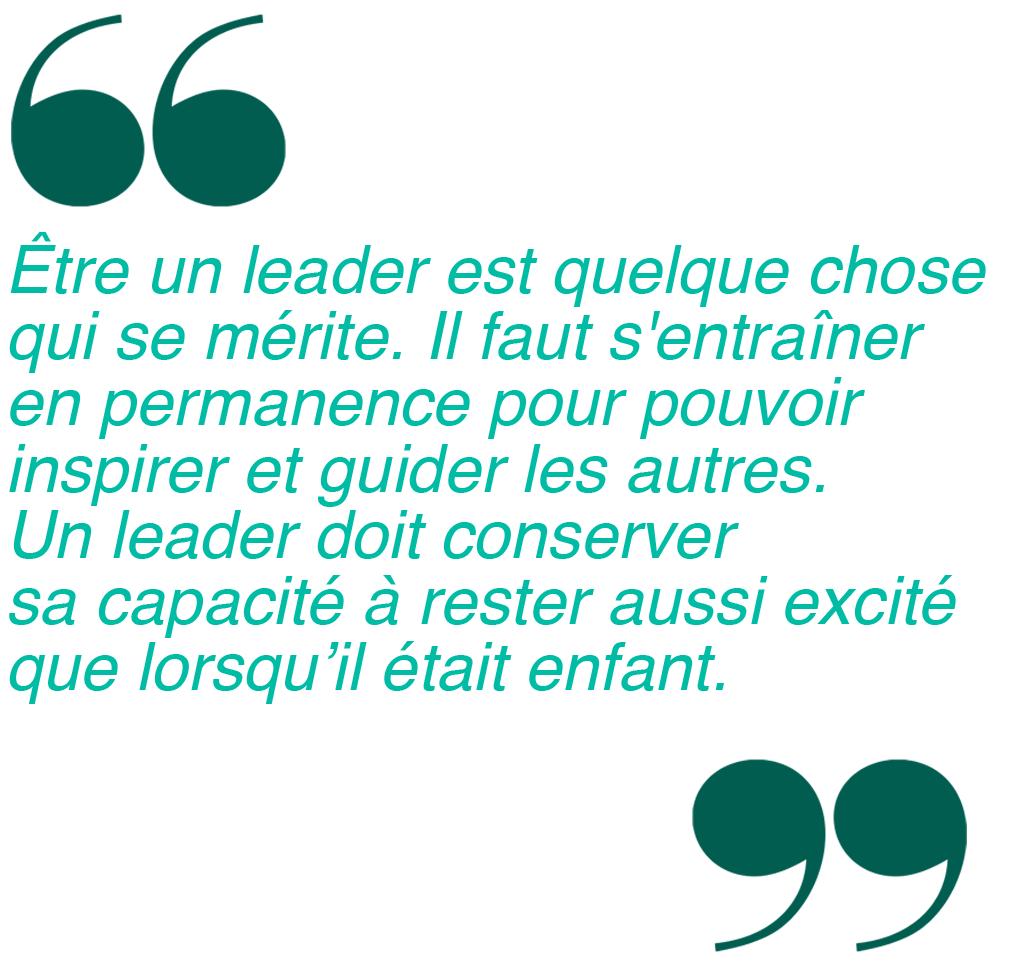
Comment la kindness se traduit-elle dans l'entreprise que vous dirigez? Comment cette kindness est-elle "institutionnalisée"?
Bien sûr, Starbucks a des processus et des systèmes qui valorisent la kindness. Lorsque nous évaluons des personnes, nous commençons toujours par des résultats positifs et ce n'est qu'après que nous passons à discuter des domaines à améliorer. Mais c'est avant tout une culture. La culture de la reconnaissance du travail accompli par les gens. On commence chaque rencontre par un café, on se raconte comment ça se passe et on partage nos vies personnelles. Lors de nos réunions, nous laissons toujours 2 chaises vides, l'une qui symbolise nos gens (que nous appelons partenaires, pas employés), l'autre nos clients. Et à chaque fois, nous nous demandons quel impact notre décision aura sur nos employés et nos clients.
Quel conseil donneriez-vous à des chefs d'entreprises qui souhaitent commencer à introduire plus de kindness dans leurs sociétés?
Un leader doit commencer par une prise de conscience. Vous devez savoir où vous êtes sur le chemin. Même si cela signifie admettre que vous n'êtes pas là où vous devriez être. Deuxièmement, vous devez partager la vision. Si vous ne partagez pas la vision de l'endroit où vous voulez aller, les autres auront du mal à vous suivre. C'est une erreur que je fais aussi. Parfois, je sous-estime le fait que les autres ne pensent pas comme moi et ne se sentent pas comme moi. L'autre considération est qu'il faut se rendre compte que les générations nées au cours des 30 dernières années ont évolué beaucoup plus rapidement que les précédentes. Elles ont grandi avec la technologie comme partie intégrante de leur vie par exemple. Vous devez adapter votre style en tenant compte de leurs caractéristiques.
Le sport joue un rôle important dans votre vie. Si vous pensez à la fois au sport et à la kindness, qu'est-ce qui vous vient à l'esprit?
Le souvenir de quand j'ai commencé à jouer au football à l'âge de six ans. Surtout le moment où vous avez attendu sur le banc de touche - avec patience et respect - qu'un autre enfant vous invite à jouer. Et l'émotion de surmonter les peurs à travers l'expression du corps.
NOTRE INVITÉ

Giampaolo, 40 ans, est né à Florence et fait de sa carrière sportive une philosophie de vie qu'il applique au monde du travail. Il parcourt le monde au travers de diverses expériences internationales dans l'hôtellerie jusqu'à son retour en Italie, où il atterrit chez Starbucks à Milan. Personne positive, déterminée dans ses objectifs, il supervise l'arrivée en Italie du géant américain avec son café, défiant toutes les attentes.
“Starbucks me donne l'opportunité de grandir professionnellement mais surtout au niveau humain, chose dans laquelle j'investis beaucoup de mon temps” - Giampaolo Grossi.
Italian version
CONVERSAZIONE CON GIAMPAOLO GROSSI, LEADER GENTILE

Fiorentino doc, Giampaolo Grossi, è l’attuale General Manager di Starbucks Italia. Per chi è pratico di Milano, si deve a lui l’apertura della Starbucks Roastery, ormai diventato uno dei simboli della città. Prima di assumere la guida di Starbucks Italia, Giampaolo ha girato il mondo e ha fatto tantissimi lavori diversi, occupandosi di lusso e di ospitalità. Fatto piuttosto raro tra i business leaders, Giampaolo ama scrivere e comunicare. Ha fondato l’iniziativa Il Lusso Gentile, e Germana Barba, advisor di KINDNESSforBusiness, lo ha intervistato per conoscere la sua personale concezione di gentilezza.
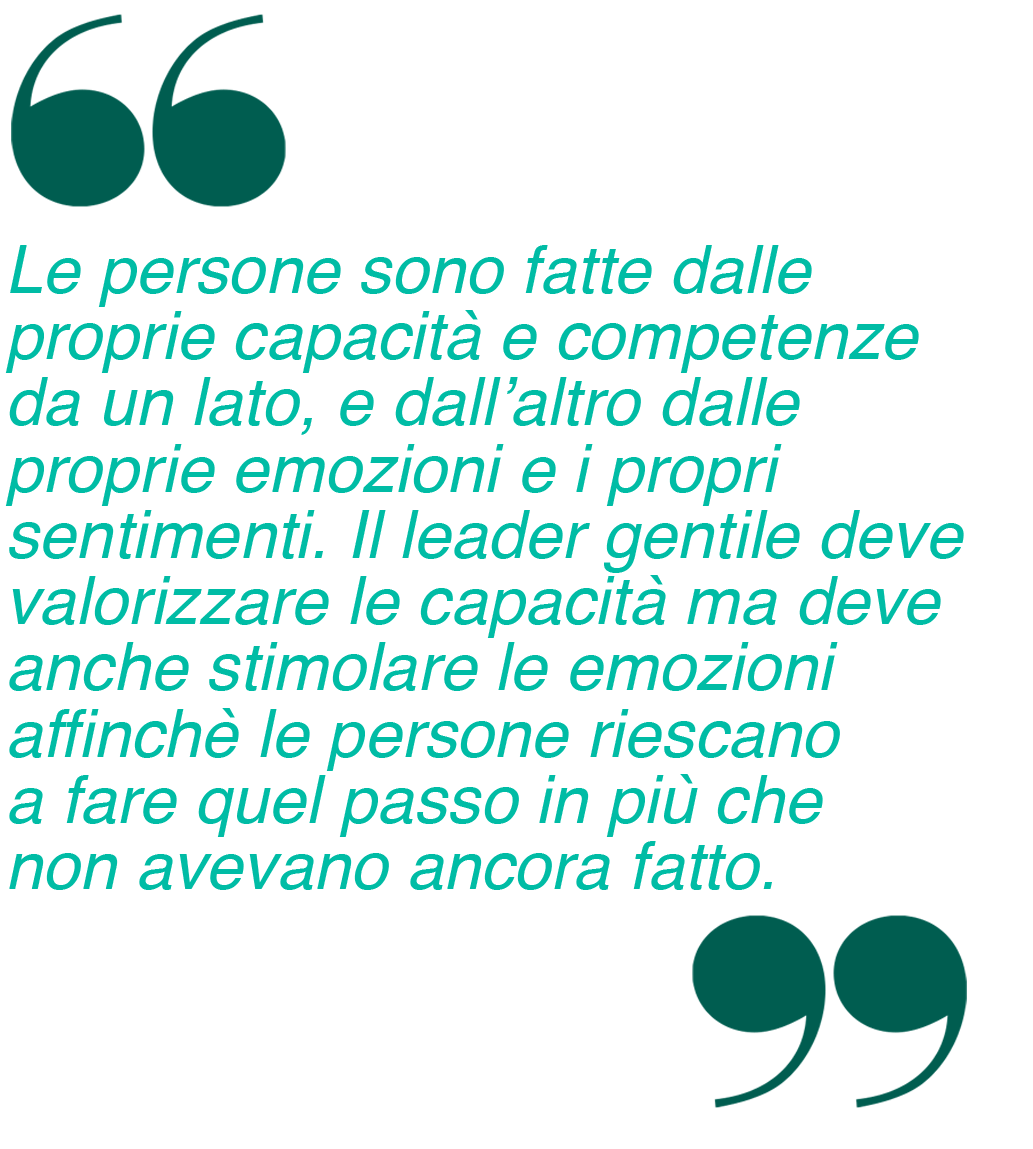
Bentrovato Giampaolo e grazie per aver accettato di parlare con KINDNESSforBusiness. Vorrei cominciare chiedendoti come ci si sente a guidare un business straniero che rappresenta uno stile di vita come Starbucks, in un Paese come l’Italia che di stile di vita se ne intende...
È un onore. Rappresentare un’azienda come Starbucks in un mercato così delicato ma che è anche un punto di osservazione per tanti addetti ai lavori è una grande fortuna. È anche una grande responsabilità. Starbucks rappresenta uno stile di vita, uno status symbol, costruito giorno dopo giorno nei 50 anni di storia dell’azienda. La nostra missione è “Ispirare e nutrire lo spirito umano - una persona, una tazza, un quartiere alla volta.” Starbucks non è un’azienda di caffè. E’ un azienda di persone che servono caffè. Le persone e la relazione con il prossimo sono al centro del nostro operato.
Per strada ti fermano e ti chiamano “Mr Starbucks”...
Quando succede in genere rispondo che “Mr Starbucks” è qualcuno molto più in alto di me... Ma naturalmente fa piacere. Quando il fondatore di Starbucks, Howard Schultz creò questa azienda negli anni ’70, fu fortemente influenzato dalla propria esperienza personale. Una delle cose che ha fatto negli anni ’80 è stata quella di offrire l’assistanza sanitaria a tutti i lavoratori dell’azienda, ben prima dell’Obamacare. Lo ha fatto perchè quando era piccolo suo padre, che faceva il trasportatore e che era l’unico a portare i soldi a casa, si ruppe una gampa e dovette smettere di lavorare, e negli Stati Uniti a quell’epoca non lavorare significava non essere pagati. La dimensione umana e personale finisce sempre per riflettersi nelle organizzazioni.
Che cos’è per te la gentilezza?
La gentilezza è musica. Dovrebbe essere l’aria che si respira. Quella mattina armoniosa con il sole fuori che ti rende l’animo contento. La gentilezza è un regalo che si fa verso gli altri e soprattutto che si fa verso se stessi. In effetti dare gentilezza agli altri significa in primis amare se stessi. Io provo molta soddisfazione quando vedo negli occhi delle altre persone l’emozione di aver gradito un gesto gentile. È anche una capacità che bisogna allenare continuamente. Perchè a tutti noi piace ricevere la gentilezza ma non tutti noi la diamo. In Italia si tende ad associare la gentilezza ad un posizionamento sociale. Ma in realtà la gentilezza è accessibile a tutti.
Come si trasferisce la gentilezza nel business? Cos’è la leadership gentile per te?
La leadership gentile si cura delle persone. Dedica tempo di qualità alle persone. Non significa per forza ascoltare gli altri per ore e ore. Ma significa farlo in maniera cosciente e attenta, così da dare alle persone lo spazio di esprimere la loro opinione, di dare feedback. Vuol dire anche condividere la propria vulnerabilità per entrare in empatia con gli altri. Le persone sono fatte dalle proprie capacità e competenze da un lato, e dall’altro dalle proprie emozioni e i propri sentimenti. Il leader gentile deve valorizzare le capacità ma deve anche stimolare le emozioni affinchè le persone riescano a fare quel passo in più che non avevano ancora fatto.
Come è nata in te questa filosofia?
A 6 anni ho perso mia madre. Mia nonna ha abbandonato tutto e si è trasferita a casa nostra per crescere me e mia sorella. Lei mi ha dato una forza straordinaria perchè ha avuto il coraggio di lasciare tutto per dedicarsi a noi. E mi ha trasmesso la gentilezza perchè era il suo modo di essere. Mi ha insegnato che quando viene qualcuno a prendere il caffè si apparecchia la tavola, si tira fuori il servizio buono e i biscotti, e tutte le attenzioni possibili. Quando mi chiedono chi è stato il mio mentore, la mia risposta è: mia nonna.
Dietro ogni leader c’è sempre una storia personale...
Io non mi definisco un leader, non sta a me farlo. Quello che so è che essere leader è qualcosa che bisogna guadagnarsi. Bisogna allenarsi continuamente per riuscire a ispirare e guidare gli altri. Un leader deve conservare la capacità di emozionarsi come quando era bambino. Quando cresciamo ci dimentichiamo da dove veniamo e il percorso che abbiamo fatto. Io mi emoziono a vedere un cane che mi scondinzola, il bambino nella macchina davanti che mi saluta. Sviluppare la sensibilità per i dettagli e collegare i dettagli alle storie, agli insegnamenti. Per capire meglio gli altri.
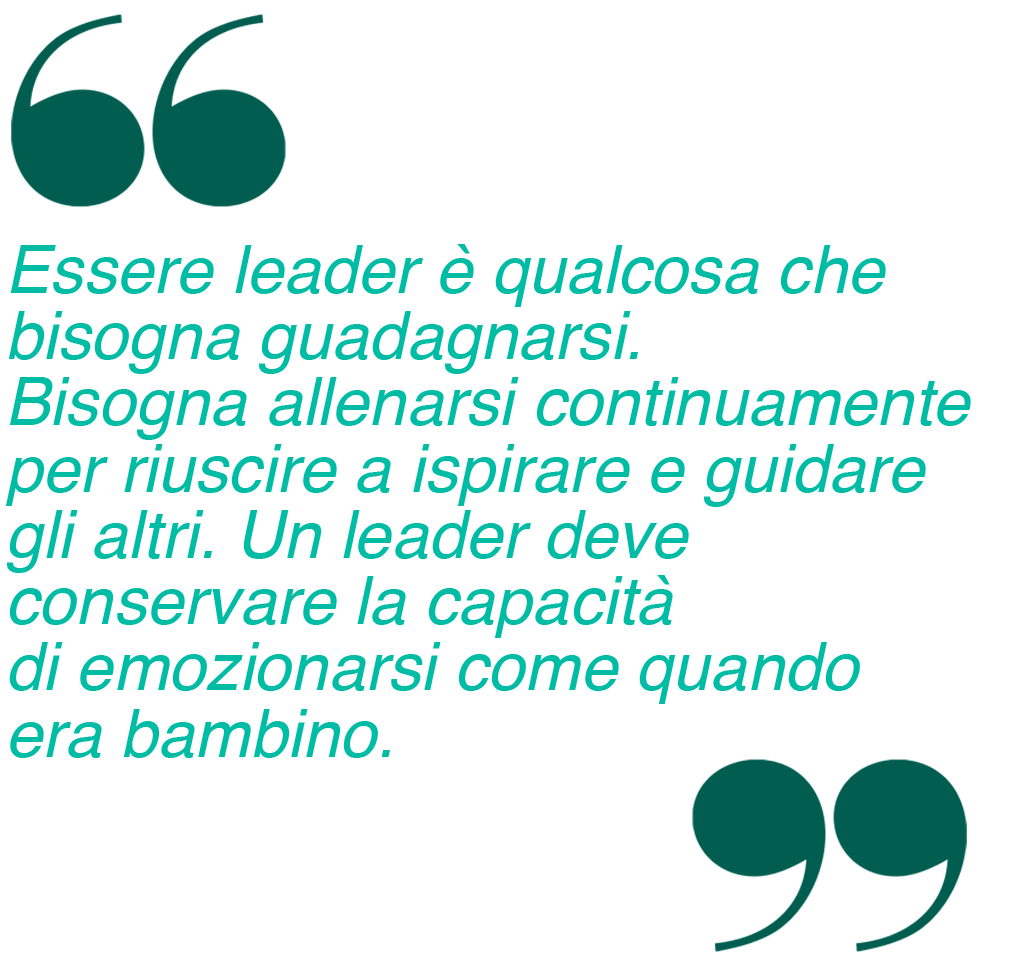
Come si traduce la gentilezza nell’azienda che guidi? Come si “istituzionalizza” la gentilezza?
Naturalmente Starbucks ha processi e sistemi che mettono in pratica la gentilezza. Quando valutiamo le persone partiamo sempre dai risultati positivi e solo dopo passiamo a discutere le aree di miglioramento. Ma è soprattutto una cultura. La cultura del riconoscimento del lavoro fatto dalle persone. Noi iniziamo ogni meeting con un caffè, ci raccontiamo come va e condividiamo le nostre vite personali. Nelle nostre riunioni abbiamo sempre 2 sedie vuote, una che simbolizza le nostre persone (che noi chiamiamo partners, non dipendenti), l’altra i nostri clienti. E ogni volta ci chiediamo che impatto avrà la nostra decisione sulle nostre persone e i nostri clienti.
Che consiglio daresti ai capi d’azienza che vogliono intraprendere un percorso per introdurre la gentilezza nella loro organizzazione?
Un leader deve partire dalla consapevolezza. Bosogna sapere dove si è nel percorso, anche se sigifica ammettere che non si è dove si dovrebbe essere. Poi bisogna condividere la visione. Se non condividi la visione su dove vuoi arrivare, gli altri faranno fatica a seguirti. Questo è un errore che faccio anch’io. Qualche volta sottovaluto il fatto che gli altri non pensano come me e non sentono come me. L’altra considerazione è che bisogna rendersi conto che le generazioni nate negli ultimi 30 anni si sono evolute molto più rapidamente di quelle precedenti. Nascono con la tecnologia come parte integrante del loro essere ad esempio. Bisogna adattare il proprio stile tenendo conto delle loro caratteristiche.
Lo sport ha un ruolo importante nella tua vita. Se pensi a sport e gentilezza, cosa ti viene in mente?
Il ricordo di quando ho cominciato a giocare a calcio, a sei anni. In particolare il momento in cui aspettavi a bordo campo – con pazienza e rispetto - che un altro bambino ti invitasse in campo a giocare. E l’emozione di superare le paure attraverso l’espressione della fisicità.
IL NOSTRO OSPITE

Giampaolo, 40 anni, nasce a Firenze e fa del suo percorso sportivo uno spirito di vita che applica al mondo del lavoro. Gira il mondo con varie esperienze internazionali nell’hospitality fino al rientro in Italia, dove approda in Starbucks a Milano. Persona positiva, decisa nei suoi obiettivi, intraprende l’arrivo in Italia del colosso americano con il suo caffè, sfidando ogni attesa.
“Starbucks mi sta dando l’opportunita’ di crescere a livello professionale ma ancor piu’ importante a livello umano, cosa in cui investo tantissimo del mio tempo” - Giampaolo Grossi.



